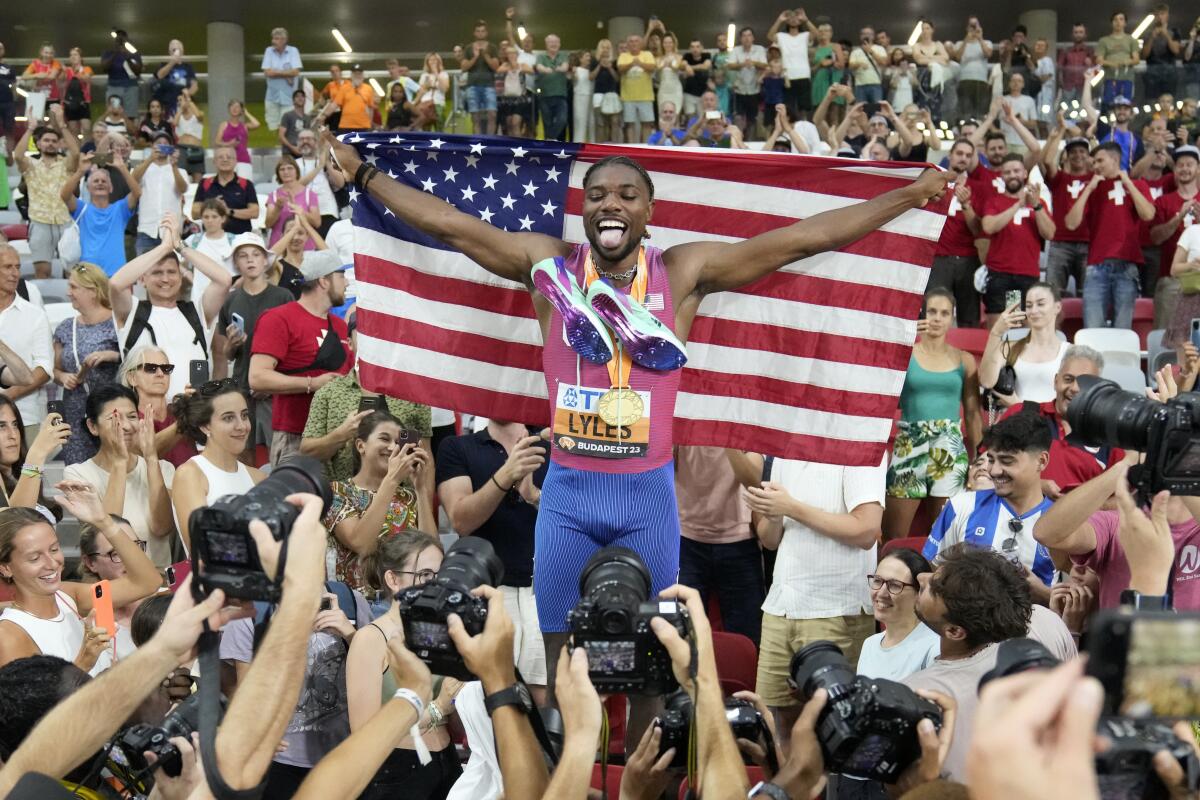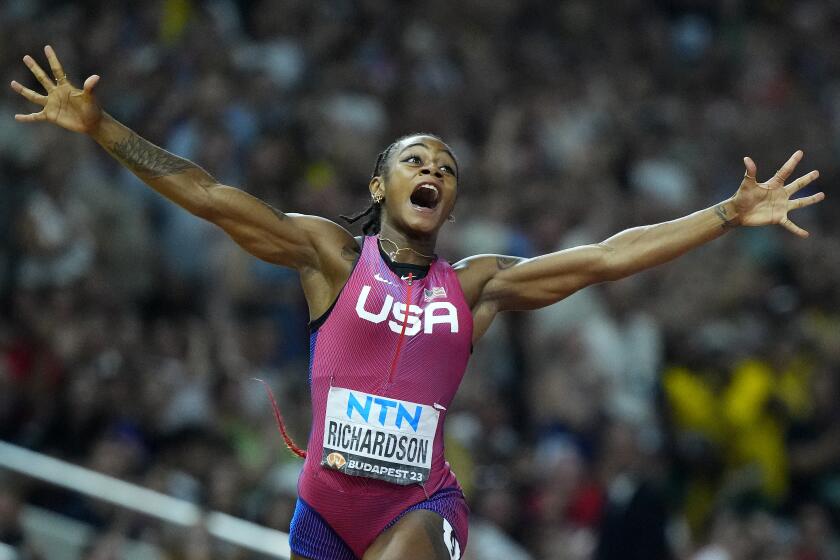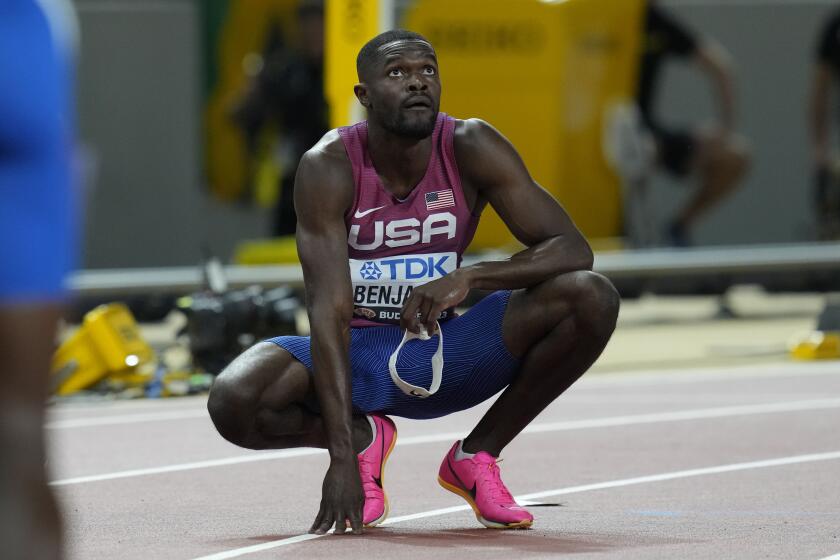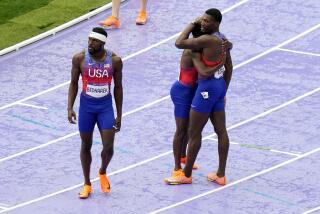Noah Lyles captures sprint double at world track championships

Some athletes reveal their ambitions carefully. Noah Lyles is not one of them.
The 26-year-old American sprinter never has been shy about his personal expectations to win titles and break records, even those set by the incomparable Usain Bolt.
Lyles accomplished what no sprinter since Bolt had done by winning the 100- and 200-meter sprints at the track and field world championships. Four days after claiming 100-meter gold, and the unofficial title as world’s fastest man, in 9.83 seconds, Lyles won the 200 in 19.52 seconds Friday in Budapest, Hungary.
“The double is done, it’s done,” a smiling Lyles told reporters. “It’s alive, it’s thriving. I’ve been talking a lot about not having pressure but of course there’s going to be pressure, no matter what, and I remember waking up today and it’s different from the 100. The 100 is fun.
“The 200, it’s personal for me. This is where I stay, this is where I’ve learned how to race, this is where I’ve gone against my biggest competition and this is my third one. With that said I took this personally; it was very personal. I knew that many guys who were coming out here with the idea of taking this from me, and to be honest they have the ability to, and after what happened in Tokyo, I said I don’t believe in deserving to win anymore. You take the win.”
Lyles joins fellow Americans Maurice Green (1999), Justin Gatlin (2005) and Tyson Gay (2007) plus Bolt (2009, 2013 and 2015) as the only men to win both the 100 and 200 at a world championship. Bolt also swept both sprints in the 2016 Olympics.
Known as a slow starter, Lyles instead started strong with the fourth-fastest reaction time in the nine-man field and held a slight edge at the halfway point before storming off the curve and controlling the rest of the race.
Nineteen-year-old American teenager Erriyon Knighton won silver in 19.75, with Botswanan 20-year-old Letsile Tebogo third in 19.81. Knighton has improved at each of his last three major global championships after finishing fourth in the Tokyo Olympics and third at last year’s world championships in Oregon. If he and Tebogo represent the up-and-coming generation in the 200, what Friday made clear was that Lyles appears nowhere near close to giving up his hold. Lyles has won the 200 at three consecutive world championships, a feat only Bolt has surpassed.
Sha’Carri Richardson won the 100-meter title at the world championships, but it didn’t set in until she saw her time — a meet-record 10.65 seconds.
Just as Lyles has been open about his ambitions, he has not shied from discussing what fuels them. His third-place finish at the Tokyo Olympics was far from his golden expectation, and competing in an empty stadium because of COVID-19 restrictions left the self-described natural showman feeling empty. He told The Times in December that he left his first Olympics with depression and found help through therapy. Less than 10 months later, he won the 2022 world championship, retaking his place atop the podium and setting the stage for his three-peat.
“He’s the type that a little bit of adversity actually helps him,” his coach Lance Brauman, who also coached Gay, said in December, “as far as refocusing and get back to the basics and get that hunger to go out there and prove himself.”
In the women’s 200 final, Jamaican Shericka Jackson denied Sha’Carri Richardson her own 100 and 200 double by storming to gold in 21.41 seconds, a record for the championship and the second-fastest time in history, behind only Florence Griffith-Joyner’s 21.34 in 1988.
Days after Jackson was edged by Richardson in the 100, she left no doubt in this race, winning by four-tenths of a second, an enormous gulf in sprinting. She was followed by Americans Gabby Thomas, who entered Friday with the world-leading time this year and claimed silver in 21.81 seconds, and Richardson, who earned bronze in a personal-best 21.92 seconds.
Richardson was vying to join the exclusive club of sprinters to win both the 100 and 200 at the same world championships, a group with just three members: East Germany’s Silke Gladisch-Moller in 1987 and Katrin Krabbe in 1991 and Jamaica’s Shelly-Ann Fraser-Pryce in 2013.
Norway’s Karsten Warholm, the world record-holder in the 400-meter hurdles, won the gold with Kyron McMaster second ahead of Rai Benjamin.
Just as in the 100, Richardson ran the 200 from the farthest outside lane, with all competitors to her left. Thomas was just to her inside in the eighth lane and Jackson, the reigning world champion, in the sixth lane.
Thomas entered with confidence after running this year’s world-leading time, a 21.60 that won her the U.S. championship in July, hours after Jackson posted the previous world-leading time of 21.71. In all this season, Jackson had run 22 seconds or faster four times and Thomas three times. By those measures, at least, Richardson settled into the blocks as more of an underdog than she had been in the 100: Her lone sub-22 clocking of 21.94 was this year’s fourth-fastest.
At the halfway point Friday, Jackson already had taken control, passing in 11.05 seconds, with Thomas next-fastest in 11.20. Richardson was in fifth at that point but used a strong final straightaway to win the second medal of her first global championships.
Also Friday, American Athing Mu avoided falling in her 800-meter semifinal to qualify for Sunday’s championship race. Mu, the reigning Olympic and world champion who trains in Los Angeles under coach Bobby Kersee, was clipped with more than 300 meters to go and staggered briefly but kept her balance in a race in which the top two finishers qualified for the final. Calmly but quickly, Mu moved up into second.
More to Read
Go beyond the scoreboard
Get the latest on L.A.'s teams in the daily Sports Report newsletter.
You may occasionally receive promotional content from the Los Angeles Times.









